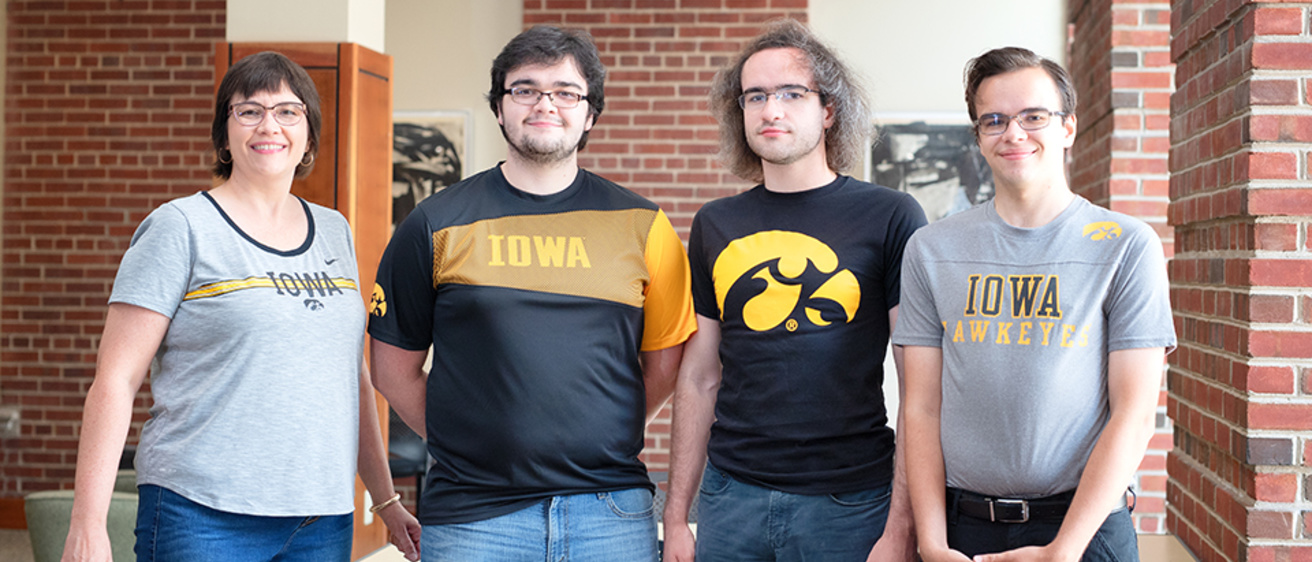Shamus Roeder will graduate from the University of Iowa this spring with a master’s degree in biomedical engineering.
But the UI will still have plenty of Roeders to go around. Shamus' brothers, Tristan and Teagan, and his mother, Shona, still will be students.
“We’re all here together because the time and place happen to be right for all of us: The University of Iowa and right now,” says Shona, who is attending part time, studying for a Master of Arts degree in Industrial Engineering—Human Factors. Second son Tristan is a junior attending part time, and youngest son, Teagan, is a first-year student.
Shona points out that this Roeder love for the UI is nothing new. She earned her BS in psychology in 1992 and her late husband, Ted, earned his bachelor’s and MD degrees from the UI. Education has always been a family priority, she says, and they’ve never been disappointed by their academic experiences at Iowa.
Location doesn’t hurt, either.
“I graduated high school and walked six blocks to the university,” says Tristan, a theater arts major who, like his brothers, graduated from Iowa City High School. “Iowa has a good theater department, so it was an easy choice.”
The family has been a mainstay on campus since Shamus, the oldest, arrived as a first-year student in the fall of 2012. Tristan arrived in 2015 and Teagan, the youngest, arrived in the fall of 2018. Having so much experience on campus pays off in small ways for the family. For instance, moving Teagan into his Slater Residence Hall room last fall was a snap.
“We have that move-in routine down pat,” says Teagan, who has not yet declared a major but is strongly eyeing political science because he hopes to pursue a career in politics, with a minor in Chinese.
The family quickly puts to rest any speculation that this is some sort of cutesy family bonding ritual. They are serious students, and they are going to school to learn and prepare for their careers.
“I never meant to chase them to college,” says Shona, who plans on a career in workplace safety, although she’s keeping her options open depending on what she learns about her field during the next few years. “I asked Shamus if he felt I was stepping on his toes since we had an ergonomics class together last spring and he said, ‘No, there’s 50 other people in the class.’”
Shamus admits to some trepidation being in a class with his mother, “because I didn’t know what the rules of engagement were going to be. Once we figured that out, then it was just fine.”
Tristan agrees that the family is approaching the situation with no sentimentality.
“To my knowledge, we share no classes, so it’s fine with me,” he says.
For Teagan and Shona, enrolling at the UI comes with significant adjustment. Teagan is moving up from high school and was worried about a first-year class schedule that included rhetoric, American culture, and Chinese, especially since foreign languages were never his sweet spot at City High.
“But with time and adjustment, I know I can succeed,” Teagan says. He needn’t have worried. He fit in quite well, surviving the fall semester academically and becoming president of Slater Residence Hall. He also was named a resident assistant in Slater starting in the fall 2019 semester.
For Shona, the learning game is old hat, having already earned her BS. Her biggest adjustment has been to the changes in higher education over the 27 years since she graduated with that first degree. Today, computers and technology are at the heart of teaching and learning. Laptops are everywhere, classrooms are filled with digital tools to help professors teach and students learn, the library has long since disposed of its card catalogs, and academic papers in thick journals can now be read on a smartphone.
“I brought a typewriter to school the first time I attended,” she says, acknowledging that getting used to the technology has taken some time.
“Everyone assumes you’re completely fluent in computers and phone apps, but I’m a technology immigrant,” she says, noting that Shamus helped her learn to code. “I’m not nearly as fluent as my kids.”
But she sees advantages, too, with technology such as scientific calculators doing the heavy lifting and freeing up brain space to comprehend the ideas.
“You can think of things now instead of taking notes in a panic,” she says. “I want to go more slowly this time around, taking fewer classes at a time and learning to master the material and remember it, rather than cramming.”
Because she’s attending part time, she’s not sure when she’ll graduate. It’ll happen when it happens, she says. The same is true of Tristan, who also works part-time at the Hamburg Inn in downtown Iowa City. He’s aiming at a career working behind the scenes in theater or TV, though he’ll be front and center this summer as a performer on the renaissance faire circuit around the Midwest.
Shamus, meanwhile, is a fellow in the Heartland Center for Occupational Health and Safety in the College of Public Health and received his undergraduate degrees in biomedical engineering and human physiology in 2017. He’s working feverishly to complete his thesis in time for graduation this spring and then plans to get back to a business he co-founded, ABAL Therapeutics, which designs tablet and smartphone software that automates a form of therapy for autistic children. The company won Texas Christian University’s prestigious Values and Ventures business start-up competition in 2018 and was named the UI Student Startup of the Year.
